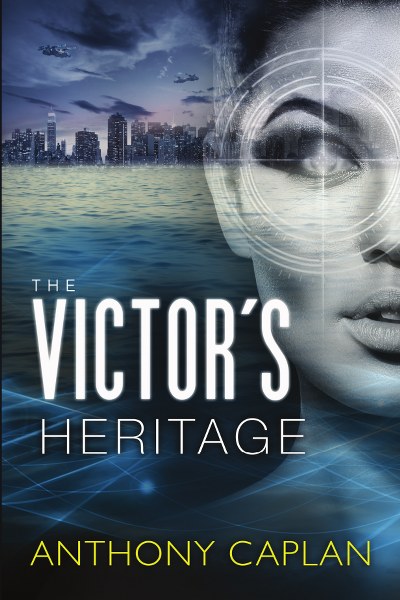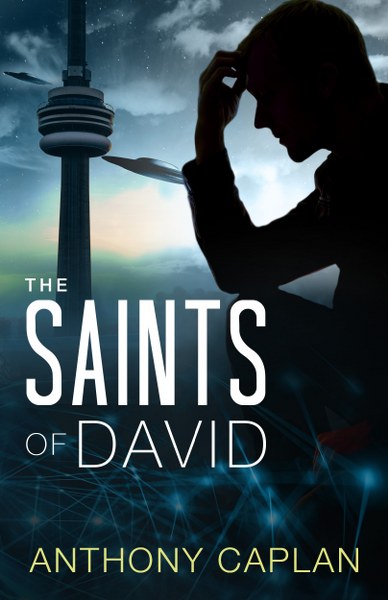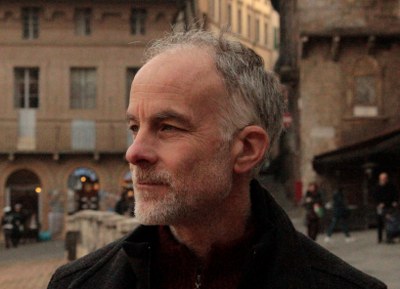
Savior

and son stumble into the secret world of the Santos Muertos, a
crime cartel bent on global domination. The son must find his father
and keep the secret of the ancient Mayan code underlying the creation
of matter in the universe from falling into the wrong hands.
best . . . a fascinating combination of high adventure and
interpersonal relationships that keep Savior an exciting,
unpredictable read right up to its emotionally charged (and
satisfying) conclusion.”
definitely a story of love and sacrifice.” —Highway-YA
the psycho analysis of their behavior. The plot is very well
constructed….The plot is very intense and it is guaranteed that you
will be hooked from the first page on this incredible adventure,showing that a love between father and son has no limits. I recommend
this book to the permanent library of all readers that enjoy a very
well written novel and want to be entertained.”
thriller/dystopian genres, with turns of phrase that startle with
their elegance without ripping the reader away from the plot or
descriptions . . . It is exemplary in its stellar use of language,
its complex plot and characterizations, its ability to derive truths
and fallacies and the thin veil separating them.”
kept me interested to the end. The Canadian connection made it even
more exciting.” —J.C., Rockwood, Ontario

The Victor’s Heritage

Victor’s Heritage parallels
contemporary events. It is 2045. America has been shattered into two
countries. Democravia and the Republican Homeland. Peace between the
two continental rivals is always fragile.
˃˃˃ Rebellious teens seek to forge their own
path, but is that always so terrible?
into a world that she is
ill-prepared for and yet is ready to embrace new ideas and concepts
far from the standard “party” lines.
˃˃˃ In this latest installment of Caplan’s The
Jonah Trilogy, he captures
the force of youth, of coming of age, of new awareness that is put
together into a tale that never lets up!

The Saints of David

DAVID’S TOWER?
THRILLER
run along with members of their renegade theater
group — the last of the free brained creative folk against the
enslaved people of the Augment and their elite Republican Homeland
overlords.
flows in the Augment system mean there is little time to reach full
power status and launch the planetary cover before the incoming Oort
Cloud asteroids destroy civilization. Corrag and Ben make a run for
David’s Tower, an alternative society built on the democratic power
of individual stories. Corrag’s father Ricky sets out to find his
father’s book that he is sure will answer the deep-seated root of
humanity’s evil. These are just a few of the individuals on a
quest, drawn to the utopian world of the Tower, built by the man
known to his followers as the Saint. David Shavelson, a former owner
of a Brooklyn bookstore, is a charismatic visionary leading a
community in resistance against the mental enslavement of the Augment
system. The Augment leaders know they must crush the Tower or lose
control of their destiny. The battle lines are drawn. All the answers
will be found in the thrilling roller-coaster finale that is The
Saints of David.
The Saints of David, the final book in the Jonah Trilogy series, is
recommended for new and prior fans alike, who will find this wrap-up
volume a powerful conclusion to Anthony Caplan’s thriller/sci-fi tale.
the backdrop of
disaster in this 2072 story of strange romances, half-humanoids, free
thinkers and slaves, and the unAugmented people living outside the
new norm who may prove the last bastions of true humanity.
previous
Jonah Trilogy titles, will all find The Saints of David packed with a
flavor of doom and hope that makes it hard to put down and an
exquisitely compelling story that leads readers to question many
beliefs before they are through.”


has worked on three continents, Anthony Caplan lives in New
Hampshire with his family, a small flock of sheep and several dozen
carefully tended apple trees. He writes books and teaches high school
Spanish. He is a graduate of Yale University and has also worked at
various times as a taxi driver, shrimp fisherman and telephone salesman.

Chapter One –The Augment
Corrag smiled at the idea of Gurgie in her bedroom on Durkiev Drive
across town and the shock of recognition when she realized her friend had
signed off on MandolinMonkey rather than go in for the remnant. So
characteristic of a truly dynamic soul, Gurgie would say, to quit
nonchalantly on the verge. But for Corrag the reality was less comforting.
She had ten minutes before her parents called for dinner. It was a more
complex fear coming over her — of facing Ricky and Alana, the stalwarts of
St. Michael’s Close, the exclusive, tree-lined enclave of Edmundstown
where she had grown and lived her entire sixteen years. Her parents, the
Drs. Lyons as they were titled in the annual consensus, had implied that
this talk would be “important to her future.” Whatever that could mean.
Something about the boring infinitude of possibilities always just around
the corner. Like signing off on the game rather than face the interior of the
obelisk, it was easier for Corrag to be present and accounted for — ride the
tide of her parent’s displeasure — then to make a stand by remaining in her
bedroom, the private space she continued to carve out of the increasingly
imperiled Democravian Federation life she was about to leave behind.
She observed numbly as the icon came up on the nanowall, the
family crest with the towering crane and the stylized image of the
transgalactic, so twenty-thirties, and wished again she’d had other siblings,
that Ricky and Alana had been more compelled by the recommendations of
the Commission on Demography and less concerned with their augmented
careers. But so be it. There were also advantages to being the basket in
which were placed all the eggs of the Lyons family name. if only the crest
design were more compelling. She hit the kill button before the music,
theme of HG Wells acclaimed classic The Shape of Things to Come which
she had performed during her sixth grade drama season in a stellar role as
Hillary Perron, the Council leader responsible for the withering away of the
former power of the state of California, the sclerotic, corrupt vestiges of
what had once been democratic governance, could end. Now it just
reminded her of her parent’s unfulfilled expectations for her development
as a young woman about to assume the mantle of augmentation.
She descended the stairs covered in royal blue carpeting and sat at
the dining room table of molybdenum, while her father, white beard
trimmed neatly and his cardigan in the colors of the University of the Upper
West, maroon with cream pockets, beamed at her. Her mother, Alana,
continued to talk in that subtle, alluring monotone with hints of New Albion
that had entranced many faculty parties on the shores of Mono Lake.
“And I’ve always maintained that tennis induces a better oxygen
wash of the skin than yoga, Ricky. Well. Here she is. Corrag? Where is your
file?” asked Alana.
“Oh my God. Can I get my food before the interrogation?”
“Of course you can. Don’t be silly,” said her father, trying hard to
keep the sound of despair out of his voice. Alana sighed. Corrag hated
hurting their feelings, but there was nothing else to be done. This would
have to be endured. Not even Alana was going to come out of this smelling
of roses. There was probably a word in another language for the moment
when a young woman declared her independence from her family without a
pre-approved plan in place. But Corrag felt herself destined for a new form
of singular existence that depended on taking this risk.
“Have you taken a stab at the essay yet? When is it due?” asked her
father, once she had served herself from the tray offered by the housebot
of the lasagna and truffles.
“In two days,” said Alana. “It’s getting late.”
“I’m having thoughts about it,” said Corrag. “I’m not sure.”
“Not sure. Thoughts. That’s Corrag for you,” said Alana. “What is
sure for you? Nothing is ever sure in your world. You are the classic case
of choice overload. We never should have let her have a PlayCube of her
own.”
“Let her speak,” said Ricky.
They waited breathlessly, the two anxious parents, while Corrag
forked some lasagna and chewed without looking at them.
“Didn’t you always tell me to follow my desires, Dad? Well, that’s
what I’m trying to decipher. I don’t really know what my desires are. I don’t
know if it’s what I really want. That’s my problem. I want to know. I can’t
just plunge ahead into fine-tuning until I do. It wouldn’t be right for me.”
“Right for me.” Alana repeated. She dropped her fork. It clattered on
her plate. Ricky grabbed his head helplessly with both hands. The bot,
sensing some urgency, circled the table speedily. Corrag waved it away
with her hand and looked at it with a hard stare that sent it back into the
kitchen through the energy panel.
“This uncertainty of yours is in total defiance of your education and
privilege,” said Alana.
“I know,” said Corrag. “But it’s what I want. Until we reach
augmentation, we can choose what we want, right?”
“Within reason, Corrag. The parents still have the final say,” said
Alana darkly.
“It’s unbelievable, Corrag,” said her father. “There are no more
exemptions. Look at the Calder boy. He wanted to take a year and read the
books in his grandfather’s library because he said he “valued the
experience” of holding the words in his head instead of instant upload. He
tried to argue in the consensus – you don’t remember, do you? – that the
year of reading was worthwhile. But there were no more exemptions. Do
you understand? He was effectively exiled. The only thing left to him was
the HumInt Corps. Is that what you want? Hundred mile marches in the
swamps where not even the bots can go? Certain premature death? No
augmentation means no physical corrections.”
“That’s not true. There are other things,” said Corrag, the color rising
in her face.
“Like what?” asked Alana.
“I don’t know.”
“Uugh,” grimaced Alana, her face wrinkling like a prune despite the
botulin implants.
“Look,” said Ricky. Corrag could see the glint in his eye that told her
he was probably in the cloud. “It’s a common condition of human
childhood to seek individuation. We try to condition it away, but the
vestiges of the trait are stronger in some and may require remedial
conditioning. Or else you can choose the Vocag. There are some
interesting possibilities. If you like manual work.”
“Okay,” said Corrag. She’d heard it all before, The path of the
conversation had taken a familiar tack that apparently was not remembered
by her father. But Alana would not have it.
“Do you know what that is? It’s not exactly gravy, is it. Give them run
of the greenhouses. How … utterly tacky.” said Alana.
“So? Somebody has to grow the food. I thought we were all in this
together. Hail the Federation. Smile all the while.”
“Corrag,” said Alana sharply.
“What?”
“Look,” said Ricky. “I can accept that you need time. You’ve always
been … different.”
“What are you talking about, Dad? I’m just like you. Have you
forgotten? You’ve told me about refusing to play football. How your dad
took it hard. How you had to find your own way.”
“I know. You’re … different. Yes, like I was once. That’s why we love
you. We’ll continue to support you in your choices no matter what.”
“But she doesn’t know what she wants.”
“Give her a year. What if we send her to New Albion to stay with
Geoff and Joan. She can work with them, I don’t know, the cows and the
vegetable garden and get a real taste of life in the Republic. How does that
sound, Corrag? It’s a world away from here. You haven’t seen your cousins
since you were oh, two years old.”
“I don’t remember.”
“I agree,” said Alana, with the glint in her eye. “At first I thought it
was a bad idea. After all, the Republic’s ideas on education and adulthood
are very different than ours. I just don’t know how it will sit with the
Council.”
“I’ll run it by Mitchell Culpepper. There is the youth emissary
program. It’s usually staffed by graduates of fine-tuning, but they may
make an exception for me.”
“And I’ll get in touch with Joan. There’s the risk of course …”
“Of course. But … paradoxically there are less opportunities for
young people in the Repho. The reliance on market forces will always
prove inefficient as a mechanism to harness the singularity.”
“Do call Mitchell.”
“I will dear. Tonight.”
Ricky and Alana finished their dinner with occasional glances
Corrag’s way. The matter was closed as far as they were concerned. Corrag
watched her parents, wondering at their ability to turn on a dime
conversationally once all the options had been thoroughly considered. For
her, though, a year abroad loomed mysterious and menacing. She hadn’t
heard them talk about the New Albion family in forever, and why that would
be the best option for her was not clear. Corrag had, in the back of her
mind, figured they would find a way to get her private tutors to prepare for
augmentation, with some kind of mental health dispensation. Sure it would
have channeled her into the arts, but that was where she felt at home,
without the responsibility for determining the way forward for the entire
civilization. Just entertain us, that was the mandate for the ArtSmile corps
coming out of the Federation system. Most of their recent mindscapes and
challenges were pretty bland. The occasional bootleg memes from
Sandelsky, the main branding of the Republic that teenaged hackers
sometimes spread around the play spheres, far outstripped Democravian
productions in technical flair; and they just seemed deeper, somehow more
important.
She advanced around the dark corner. The street was empty except
for a parked vintage Bundeswehr quadcopter on the right. She passed it
and lifted her head. In her hand she hefted the laser pistol and aimed it at
the bonfire about three blocks away. The Mandolin headquarters was a
square, black obelisk, modelled on a classic Anish Kapoor sculpture. The
fire raged around its doors and she had to shoot her way through a crowd
of ripper monkeys. They were easy. They always aimed right for your head
and all you had to do was duck several inches and fire back at the same
time in their general vicinity. The game makers had been recently faulted at
a consensus for setting the adversarial level purposefully down market in
order to secure continued funding. For Corrag, the subtext was clear. Life
was a popularity contest. No matter how efficiently the council liked to
think it was going you couldn’t do away with the basic human flaws of
wanting, desiring, seeking what was out there. Greater RAM speeds and
advanced neural networks had never gotten to grips with the pattern-
making propensity of the human brain and the magnetic allure of pleasure
which threw up the energy-matter continuum all around. MandolinMonkey
did a good job of smoothing the jolts of scenic transition and stimulating
the pituitary with each new level attained. Still, she found herself
impatiently bypassing the obvious level trap with a joystick function and
flying down the hallways unmindful of lesser adventures and parallel
opportunities. Above and behind her avatar there sprung two Greckels,
stoat-like creatures capable of quick extensions and sharp tears at limbs
and throats. They were Gurgie and Mathew.
“Come with us,” said a high-pitched voice.
She had five seconds. She knew she should check the table for
power surges at least, but she felt compelled to follow. If they were leading
her astray, so be it. She would find a way to dodge an ill end, as the game
makers called it. Her avatar, an Elfin, had the power over water and fire and
so was a logical complement to the Greckels’ slippery land capabilities.
What the game lacked was dimensionality of power, the ability to shape
shift and entertain various outcomes at the same time. But for now it would
do. In the end, win or lose, the only thing that mattered was displaying the
innovative spirit that the Founders wanted in the future leader corps. Once
you had that hacked, everything else was an easy trick. The person that
had taught her the shortcuts that had helped her to climb the ranks
Federation wide was Ben Calder. Where was he now? Was he still
alive? Or had the stint in the Humint Corps in the Basin wars possibly
killed him, as her father had suggested? A cold stab of fear hit Corrag at
the thought of Ben dead.
They were in the obelisk. Corrag wondered how they had gotten in.
Down the hall the two Greckels paused and stood on their hindfeet at a
nanowall display. There in a neon gothic font flashed the message: Be a
Vence with us at the Spring Fest. The Vences were a rebel punk band from
the twenties, one of Gurgie’s favorites. She had their songs posted all over
the soundscape in school. The Vences had painted their faces in ghoulish
camouflage colors and had flouted the ideals of physical perfection and the
singularity long enough to gain themselves a diehard following. Gurgie’s
parents had been fans and so had Ricky, in his youth. But he hated their
music now and cringed whenever Gurgie came over for a visit trailing
“Blast Me Down Andromeda” out of her loose earpiece.
“Very smooth, Gurgie,” said Corrag, pressing the joystick dialogue
button beneath the thumb hold. The Elfin jumped and clapped, signifying
acceptance of a strange, land-based phenomenon. Corrag smiled at the
clever algorithm that had allowed her avatar to anticipate her feelings. Then
the Greckels faded into the ether and she was alone. A blank look on the
Elfin’s severe, drawn face was intriguing, as if she were pondering the
significance of life. Corrag saved and hit the power off with her index
finger, before any other competitors could appear to threaten her, and lay
down on her bed. Sometimes the Elfin almost seemed to come alive and
read her mind. That was the most frustrating thing, the apparent gap
between her capabilities and actual human feelings. There were some who
believed that bots had already made the transition, but Corrag was not one
of them. For a while she had believed, and her parents and teachers still
fostered the foundational concept, that humans and bots would soon be
equals in thought and feeling. But for Corrag the issue was now moot. In
the last year, she would guess, she had come down thoroughly on the side
that this equality was neither necessary nor desirable. Not that she dared
to voice the opinion. It would place her beyond the sphere of Democravian
influence and deem her “inconvenient” for continued leadership training.
Because the ideal of the Democravian way ever since the initial founding of
the institutional state in 2022 was to raise a cadre of youth who would
merge with the bots in order to undergo the transgalactic mission —
colonize the most desirable Earth-like habitable planets, 23 of them, that
had been so far identified as potential targets in the Milky Way. And in the
intervening two decades since the first councils and consensus meetings,
the notion of youth had of course expanded so that almost all citizens with
the appropriate formation could potentially qualify for merger. It was this
very accessibility to the highest ideals of the state that gave Democravia its
missionary fervor, its self-styled exceptionalism, and made it all the harder
for Corrag to accept that she was swimming against the stream. Though
she knew, in the darkness, under the sheets, about to fall asleep in the
silence of the Edmundstown night, that she was not really alone.




